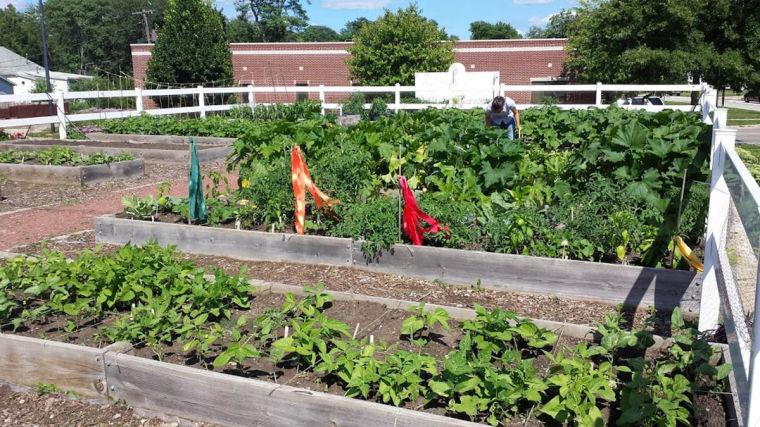Prosperity Gardens employs at-risk teens to work in gardens
The Prosperity Gardens employ at-risk youth to participate in planting, watering and harvesting, as well as assisting in the weekly farm stand.
July 14, 2014
What was once an empty lot a few years ago on North First Street in Champaign has since been turned into the Prosperity Gardens, established in 2010 with the goal of beautifying the neighborhood and employing at-risk teens to assist in the gardens.
The urban garden was started through a collaboration between the Don Moyer Boys and Girls Club and other local organizations, including the University of Illinois Extension and the North First Street Association. The founders approached the City of Champaign, which invested land and a grant for the project.
Some of the biggest challenges neighborhoods in the area and the community at large faced included the need for employment and the need for improved health.
“So we decided to form this non-profit on the base of, ‘How do we really address those systemic poverty issues that continue to plague our community through urban farming?’” said Nicole Bridges, executive director of Prosperity Gardens.
The garden holds a farm stand to sell its produce at the garden’s location at 302 N. First St. each Thursday beginning in June through September. Bridges said they set their prices significantly lower than that of grocery stores in order to address the affordability and accessibility issues that often arise when it comes to buying local foods. The garden also accepts LINK or SNAP as methods of payment.
Get The Daily Illini in your inbox!
The Prosperity Gardens have a strong partnership with the R.E.A.D.Y. Program, an alternative middle and high school program that works with families, social service agencies and educational communities in an effort to help students find success. A Prosperity Gardens staff member frequents the school during the academic year to recruit students to work in the gardens. About 25 students each semester participate.
“We work with the WIA program (Workforce Investment Act), in which R.E.A.D.Y. receives state funding to be able to allow kids to have job opportunities,” Bridges said.
Kathryn Smith, WIA coordinator and teacher at R.E.A.D.Y., added that the program helps students be “successful after graduation,” and teaches skills “that are not traditionally taught in school.”
Smith said one way they promote those skills is through R.E.A.D.Y.’s alliance with the Prosperity Gardens.
“Our partnership includes integrating urban farming and agriculture into our science classes, building and maintenance of the gardens into our math classes, … using the produce in our culinary arts classes, and proving jobs to students where they not only learn about the agricultural side of the Prosperity Gardens but also the marketing, sales, and management of a small business,” said Smith in an email.
The gardens employ students outside of the WIA program as well, with two students hired directly by Prosperity Gardens and a new extension this summer that offers opportunities to Champaign’s Summer Youth Employment Program, under which one student was hired. Workers are in charge of weeding and watering, harvesting, washing and packing the produce for sale, and setting up the market stand each week.
“High school students have a hard time getting jobs in the first place (and) having an added speckled past doesn’t help,” Bridges said. “First and foremost I think it’s really great that we’re able to offer a subset of our community job opportunities to really strengthen those customer service skills, basic math skills, and then just learning about the basics of gardening.”
Chaitra Shivaprasad, farm manager at Prosperity Gardens, supervises and works alongside the kids every day over the summer.
“I think this program is fantastic because it connects a lot of important things, right from local farming to employment of kids, and providing low cost food to the local people and educating kids about nutrition,” Shivaprasad said.
While the majority of proceeds from the weekly sale are used for growing more produce, all student employees make an hourly wage, working 20 to 25 hours a week.
The garden also connects with the neighborhood adjacent to the garden and provides people there with produce right where they live.
Bridges recently purchased a bus for the gardens with the purpose of using it for a mobile market.
“The idea is that the bus would go further into some of our under-served neighborhoods and sell that produce for really cheap,” she said.
Bridges said the program has lent itself to community development and neighborhood beautification “by turning what was once some vacant spaces just collecting trash into these really fertile growing spaces that provide employment and food for people.”
Abrar can be reached at [email protected].







